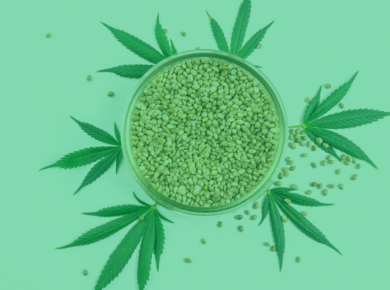As the hemp industry continues to become transparent, the number of Kosher certified hemp products is growing.
Millions of consumers around the world, of all background, seek out Kosher certified products. Many may not know what the word Kosher actually means, or how a product can become Kosher certified.
Kosher, from the Hebrew word Kasher, means pure, conforming with Kosher dietary laws. This can include no mixing of meat and milk, ritual slaughter and no consumption of insects.
Looking for Kosher Products? Join Kush.com Today >>
Kosher certification for hemp products such as extract, tinctures and capsules is a relatively simple, affordable and straightforward process.
While recreational use of cannabis is not condoned or allowed under Kosher dietary laws, it may be used for medical purposes. The topic will be addressed in a future article.

Hemp, however, does not pose such an issue. In fact, the hemp plant itself is inherently Kosher.
To determine the feasibility of Kosher certification, ask yourself these questions:
- Are products produced at an exclusive, dedicated facility or at a co-packer/toll processor?
- Where are the production facilities located?
- Is ethanol or any other solvent used in the extraction process?
- Are all the ingredients including the hemp extract Kosher certified?
This analysis enables the Kosher certification agency to gain a better understanding on what is taking place, where and how. The Kosher certification agency will then review this information and issue a quote for an annual fee.
While using exclusively Kosher certified/compliant ingredients does not necessarily guarantee a product’s Kosher status, it streamlines the process. Onsite supervision and monitoring is what completes the overall process.
For complex facilities, an initial inspection may be required to determine the feasibility of certification prior to issuing a quote. Otherwise, an annual inspection, or ongoing visits, would take place to monitor the facility’s production. Inspection intervals are dependent on the complexity of the manufacturing facility. Other factors such as the ingredients used as well as the types of products being manufactured must also be considered.
Once a company has successfully completed their Kosher certification, they receive a certificate. This certificate lists their certified product(s). A Kosher symbol for use on product labels, website and marketing materials is also included.
While there can be variations, several common forms of Kosher certification include:
- Pareve—This product is 100% dairy free and is suitable for lactose intolerant.
- Dairy—Often marked with a “D” or the word Dairy alongside the symbol.
- Dairy Equipment or DE: Does not contain Dairy, but is produced on shared equipment.
Many companies choose to secure Kosher certification from an agency that offers multiple certifications. These may include Vegan, Paleo or even Organic/non-GMO. These certifications add value and provide products with a marketing advantage over non-certified brands.
Looking for Kosher Products? Join Kush.com Today >>
Joint certification streamlines the process, as many of the steps required are often identical or similar. By doing so, companies can focus on what matters most – taking their hemp products to the next level.
About the Author

Rabbi Yehuda Goldman, CEO of the EarthKosher Kosher Certification Agency, works with companies seeking Kosher, Vegan, Paleo and non-GMO certification in over 40 countries worldwide. Based in Boulder, EarthKosher specializes in certifying hemp/CBD companies. He welcomes your comments/questions at: ygoldman@earthkosher.com



